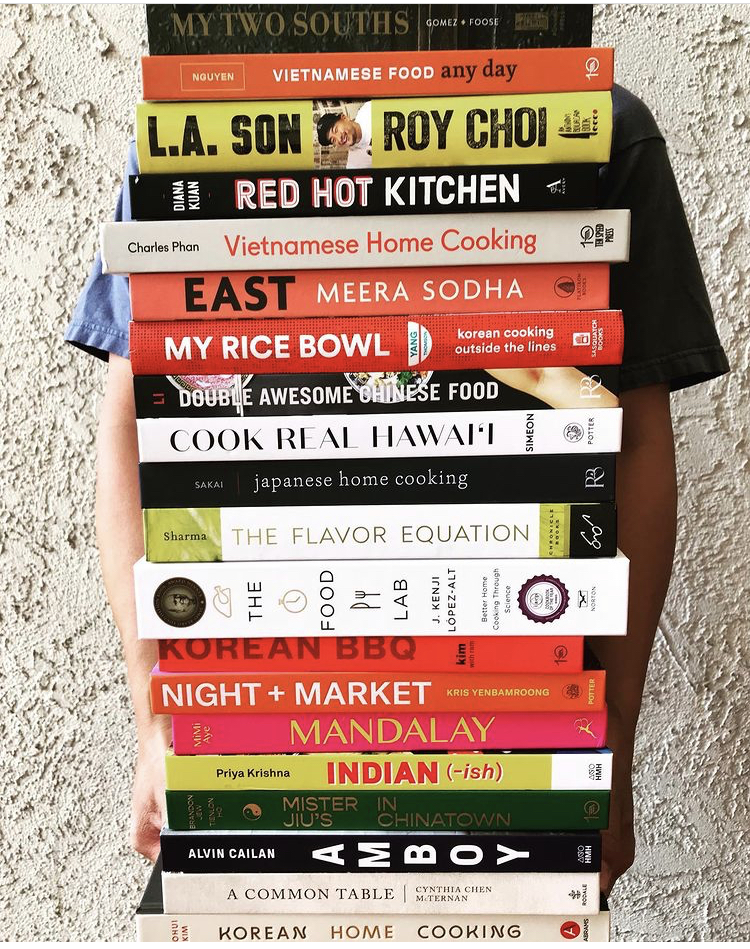
After the March 16, 2021 spa shootings in Atlanta that claimed six Asian women’s lives, a food editor invited me to write an article on how people can support the Asian American community. I have strong feelings on the subject, and the rise hate-crimes against Asian Americans was also troubling, but I declined the assignment. There are so many things people can do, and I couldn’t condense them down to several hundred words.
When I started my career in food writing, colleagues of Asian descent were few. Now there are many of us impacting the industry in various glorious ways. There are chefs, stylists, writers, editors, winemakers, sommeliers, farmers, brewers -- you name it. If you want to support the Asian American community (also known as Asian American Pacific Islander, AAPI), get to know the people.
One of the kindest, most thoughtful and unique individuals is Ken Concepcion, the chef and co-owner of Now Serving, the only cookbook shop in Los Angeles. Ken and his wife, Michelle Mungcal, opened Now Serving in September 2017. The shop quickly became one of the nation's important hubs for the culinarily curious. The couple sells books as well as a well-selected, practical collection of cooking tools and ceramics.
A Call To Action
Having done in-person at and online events for the shop, I'm a "friend of the shop." Last week, Now Serving posted the photo at the top of this article, accompanied by the resolute call to action below. Ken and Michelle are Filipino Americans and their statement struck me extra hard. I suddenly realized that within the food media world, I hadn’t seen any other curated collection and powerful statement like theirs.
I reached out to Ken, with whom I communicate often. Born and raised in New York City and Jersey City but now an Angeleno, he is easy going yet incredibly focused and steely. Not enough people know about Ken's superhuman qualities, so I decided to interview him via email, so that you may learn about him and the marvelous goings-on at Now Serving.
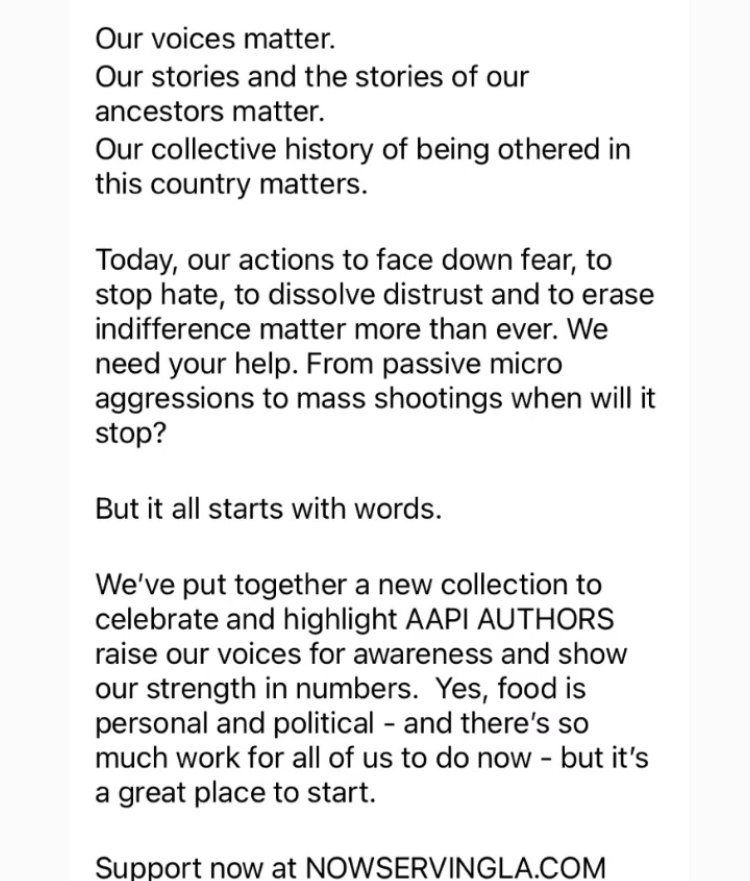
Q&A with Ken Concepcion
You studied fine art and English literature at Washington University in Saint Louis, Missouri, then worked your way up to being an accomplished chef de cuisine in Beverly Hills at CUT, one of Wolfgang Puck’s signature fine dining restaurants. What motivated you to switch your focus to books?
Honestly, it was a love of food and books since I was a child that has always been there. After working at CUT for a decade, I knew it was time to move on to something else. Michelle and I were looking for different avenues to do something different, something less formal, something more personally driven, something that we could do together as a team. The initial idea was a restaurant with a little shop on the side for books and other culinary-related items. I never went to cooking school, so I really leaned on books and job experience when I was working my way up in the kitchens I started in back in the 90s, really pre-internet, pre-“foodie culture”, before chefs were “cool”.
But in the end, we only had enough capital to open the bookshop space and decided to gamble everything on that. Pretty wild, considering that we had really no experience nor contacts with the book industry or publishing, although I did work for two years at a wonderful independent bookstore after graduating from Wash U as a receiver and on the sales floor. We just knew we loved food and people and had a specific vision.
The other piece of this was the idea that every great city should have a cookbook shop, and whenever we were lucky enough to travel, I would inevitably hunt down a local bookshop for cookbooks. The last time there was a cookbook shop in Los Angeles, it was Cook’s Library that shuttered in 2009. We wanted to open our concept before someone beat us to the punch, especially with the idea that with LA being a world class food city, it deserved it’s own dedicated cookbook shop. Michelle would always say “it would be where Ken would want to hang out on his day off from the restaurant”.
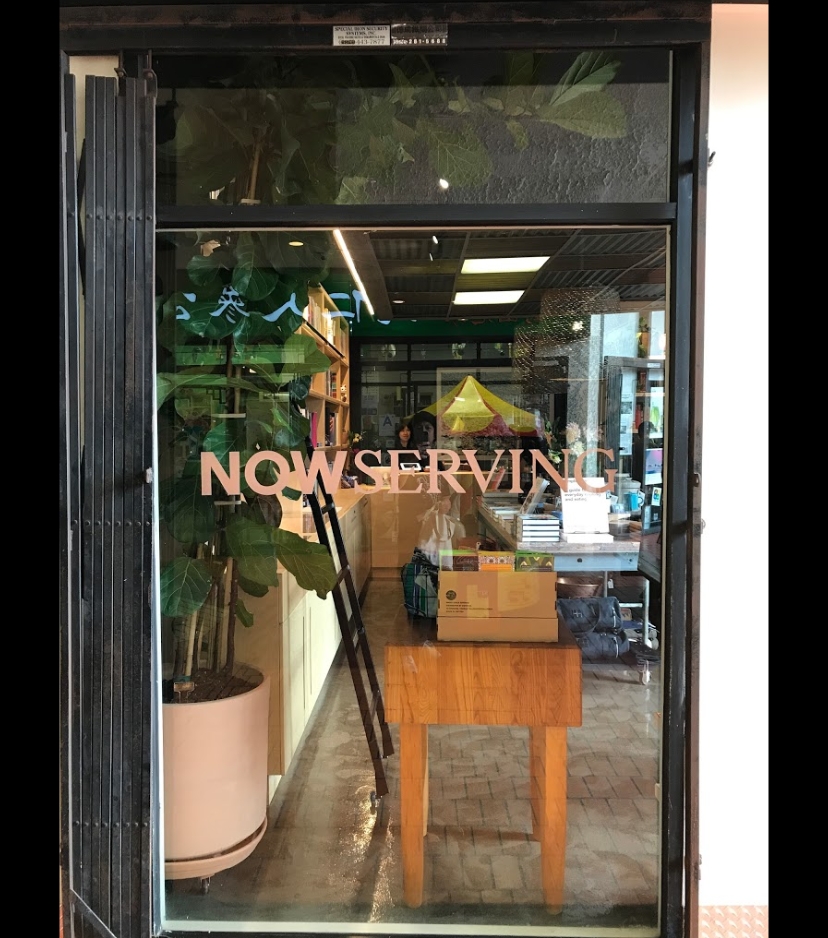
Now Serving is the only cookbook shop in Los Angeles. Your collection and interests are global. Your customers come from all walks of life. Why did you and Michelle open in Chinatown?
A few years ago there was an exciting group of chefs opening small, unique eateries in Chinatown. We knew a couple of these chefs as friends and it was great to see them bootstrap and hustle, opening their own places. No matter how small they started, it was theirs. After working for a restaurant empire, it was so inspiring and refreshing and frankly a little terrifying to see that. It felt like a community in such a historic neighborhood.
Growing up, my parents -- who had emigrated to the States in the early 70s -- always brought us down to Mott Street and Bayard to do their grocery shopping, while my brothers and I munched on BBQ pork buns and har gow waiting in the car. The lychee ice cream, the 80s robot toys! Chinatown always holds a certain kind of wonder and nostalgia for me in that way. As a kid I would gape wide-eyed at the hanging ducks, the fresh fish and shellfish still wriggling in the tubs, the colors and the smells were all intoxicating. I learned from an early age that people were different and that there was so much to learn about each other.
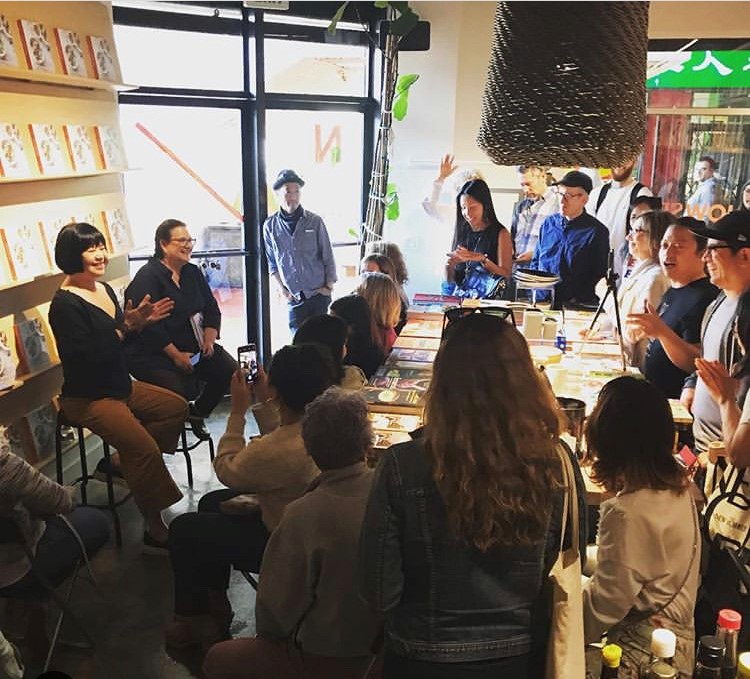
The shop launched a curated list of books by Asian American and Pacific Islanders. You and Michelle have supported culinary and cultural diversity for years, yet your call to action is extra powerful for this AAPI campaign. How has the recent rise in hate crimes against Asian Americans impacted you personally and as a Chinatown business owner?
First and foremost, we condemn all hate crimes. And to witness this happening to our Asian brothers and sisters, our elders, it’s horrifying and maddening to see, especially as parents of a young child. For me it’s also a painful reminder of growing up in the 70s and 80s -- classmates not knowing what “a Filipino” was or seeing your mother being called a “chink” in the grocery store. Last year, around January and February, we heard from other businesses in the neighborhood that business was dropping due to fears about the coronavirus and the Chinese community. But now as things have continued to escalate, we are fearful and concerned for everyone’s here in Chinatown, especially the elders.
In late January, we actually had the door open to the shop -- we have been closed to in-store browsing since last March -- and had a table set up so guests could actually walk up and talk to us about books and we could hand sell, in real life, like in The Before Times. It was heartening to see. Unfortunately, we now have the doors locked again.
You posted that it “all starts with words” and that “food is personal and political”. There are people who resist the notion that food is political. What makes food political to you?
Food to us represents a people and the culture where those people are from. From Nashville hot chicken to Armernian lule to spam musubi to shrimp & grits to Baja fish tacos, there are stories and a history from where these flavors and dishes originate from. To refuse to see those stories, to refute their respective legacies and creators is choosing ignorance and imposing privilege. A form of table-top colonialism. The lines on a map are dictated by governments especially not by its indigenous people. The supply chain of food and its accessibility here in our country, let alone elsewhere in the globe, is driven by politics. From a cook’s perspective, how can more respect and knowledge about where a dish or an ingredient comes from NOT make you a better cook?
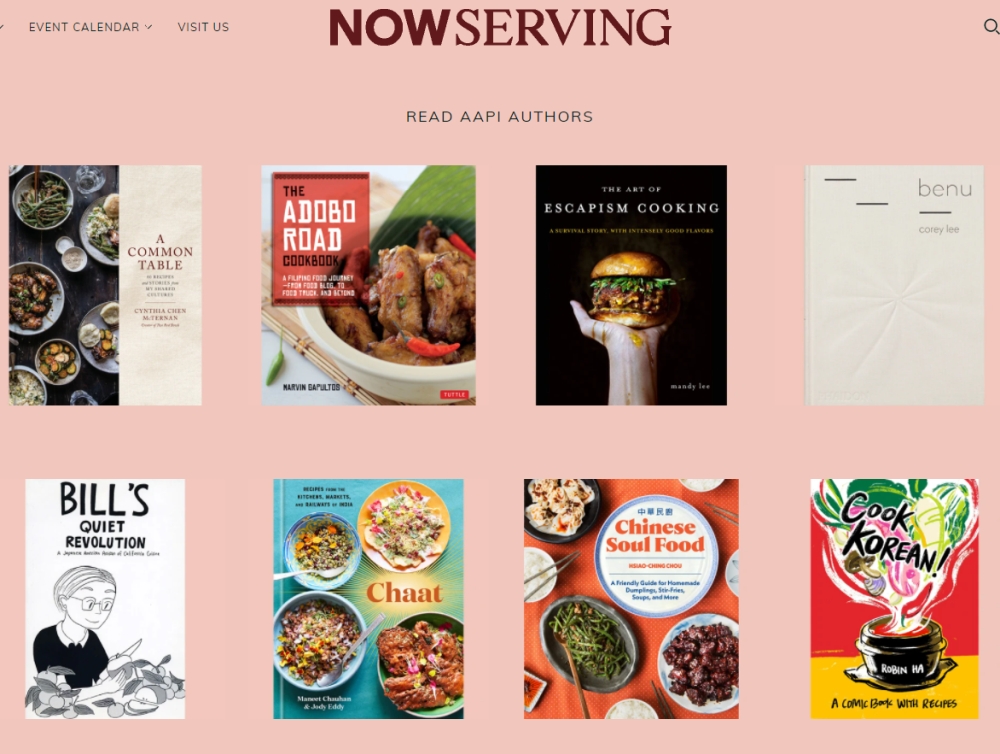
How may Asian cookbooks change people’s negative biases toward Asian people?
Hate is just weaponized fear. Just being able to share the knowledge, the histories, the origins of where Asian food comes from may make it easier to see something that might be foreign to someone, as something they can relate to, something they would want to try. We also wanted to celebrate the range of what AAPI authors can offer from someone like Nik Sharma to Hetty McKinnon to Sonoko Sakai. As your own books have shown, you can still be creative, be expressive, and play outside the sandbox while also honoring the tenets of a cuisine or its ingredients. Asians aren’t monolithic, we contain multitudes, as they say.
How did you select titles to include?
We picked a range of titles in hopes to be as inclusive as possible while also selecting ones that may be particularly interesting or generating excitement because they are a new release. Like Bill’s Quiet Revolution, which is a wonderful graphic novel by Sam Nakahira about Bill Fujimoto, a Japanese-American food retailer who played a pivotal role in the development of 1970s California cuisine or Cook Real Hawai’i from Sheldon Simeon, a wonderful new book on his personal take on growing up and cooking in 50th state.
What do you want to teach your daughter, Frankie, about this historic time we’re living through?
The hope is that while she might not remember much of what’s going on, Michelle and I really want to emphasize to her the importance of diversity -- different cultures, different voices, different flavors, different histories -- and while as a whole we are certainly stronger together, to ultimately respect where people come from wherever it may be. We need to continue to celebrate and protect the legacies of our families and who has come before us.
Keep up with Now Serving via its website and on Instagram.
Thanks for reading and becoming more familiar with the Asian American community!
Keep cooking and learning.
Food + words = power

















Christine Quiñones says
Thank you for this article! I agree with Ken’s comment “ hate is weaponized fear” and also in how important diversity is. My now adult children started primary school in a very diverse community ,53 different native languages were represented among the students. I think it was one of the most important contributions to their education. Young children are a sponge and absorb what is around them. Let’s give them the right things to absorb as early as possible.
Andrea Nguyen says
That's an incredibly good point, Christine. Children are the future and seeding a broad range of awareness is key. Thank you for adding your insights to this discussion.
Ginette Bisaillon says
This "Asian hate" is a real puzzle. Maybe because I was born and bred in Montreal where the Chinese (at the time they were pretty well the only Asians we knew) were part of our life. Every neighbourhood had a Chinese laundry and Chinatown was THE place to go if you wanted to eat out. Some of my fondest memories are a large group from our family would head for Chinatown after a wedding. A dozen of us around a large table continuing the celebration there. Children were included, and they were welcome there. Wow, I cannot believe what is happening, even here in Montreal where an Asian woman filmed a verbal aggression towards her in the metro the other day. (They found the guy and arrested him, thank god.)
Andrea Nguyen says
Unfortunately, many people view people of Asian descent as perpetual foreigners, not belonging. Ignorance leads to scapegoating.
I'm sorry to hear of the incident in Montreal. Goodness and thankfully, the person was caught.
Thanks for taking time to comment!
Robin says
This is a great post - many thanks for sharing! Here in Minneapolis-St. Paul, there's a similar cool way to use food to spread understanding and circumvent #AsianHate: https://caalmn.org/minnesota-rice/
Andrea Nguyen says
YES!!! Thank you for mentioning Minnesota Rice! I bought a ticket and donated a little extra. Love what the Twin City chefs are doing. Hooray!
Evelyn says
I had no idea until the Atlanta hate crime occurred and now, thanks to articles like this one. I have no words that can make sense of hate. I can only apologize for my own insensitivities and to that end, I'm so sorry.
Andrea Nguyen says
Thank you for taking notice and responding, Evelyn! That means a lot.